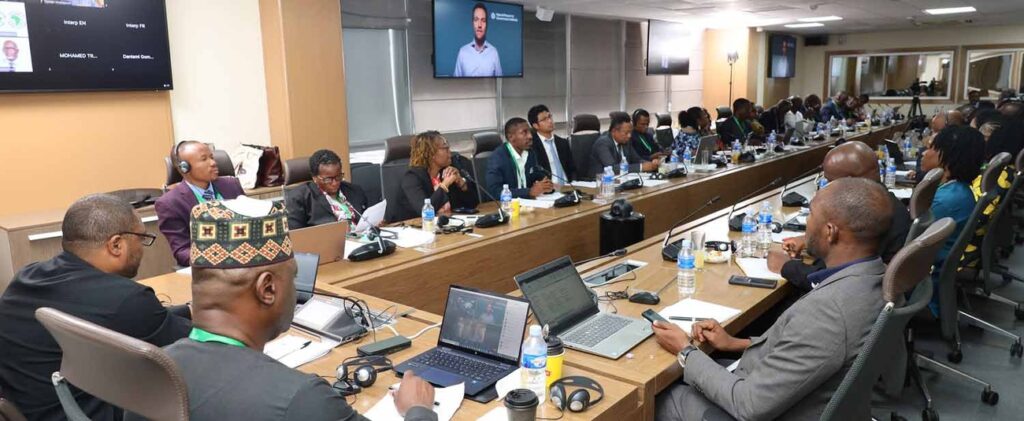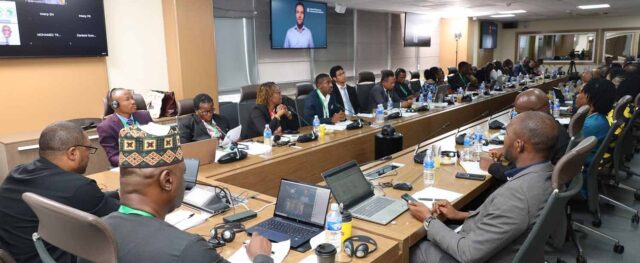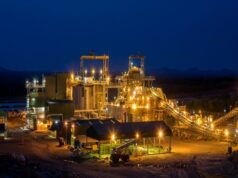In a successful effort to propel African economies in transition towards stability and growth, the African Development Bank’s Financial Modelling for Extractive Industries (FIMES) project showed remarkable results, as representatives from eight African countries benefiting from FIMES concluded a final learning workshop in Abidjan last Thursday.
Participants from Guinea, Liberia, Madagascar, Niger, Sierra Leone, South Sudan and Zimbabwe spent two days sharing their experiences of the programme launched in 2020.

FIMES is a multi-country project financed by the African Development Bank Group’s Transition Support Facility and implemented by the African Centre for Natural Resource Management and Investment (CARN). The project will strengthen the country’s financial modelling and tax revenue mobilisation capacities. It will also strengthen the institutional capacity and resilience of seven beneficiary transition countries, namely Guinea, Liberia, Madagascar, Niger, Sierra Leone, South Sudan and Zimbabwe.
Vanessa Ushie, Acting Director of the African Centre for Natural Resource Management and Investment, said that FIMES was a pioneering large-scale effort by the African Development Bank to build financial modelling capacity in Africa.
“In all beneficiary countries, the lessons and experiences shared at this workshop indicate that FIMES has supported legislative revisions in the oil and mining sector and generated comprehensive knowledge and data on key natural resources, leading to better investment agreements, policy decisions and revenue flows,” said Ushie.
“As we enter an era of uncertainty for fossil fuels, due to climate change and the transition to clean energy, it is important to build on the foundations of the FIMES project in beneficiary countries and beyond, deepening financial modelling capacity to support just transition investments in Africa,” she said.
Rakotosalama Tojo Hasina Fanomezana, Treasury Inspector at Madagascar’s Ministry of Economy and Finance, said that his country expects mining’s contribution to national gross domestic product to increase from 4% to potentially 15% over the next three years, thanks to efforts to build capacity in financial modelling for the extractive sector through FIMES.
Fanomezana said the programme had trained 23 civil servants from the mining, customs and financial sectors to improve fiscal and parafiscal policies in the extractive sector. “We recommend capitalising on current achievements by exchanging best practices and discussing common problems with other countries,” he said.
Aboubacar Sidiki Diakité, Head of Services at the Guinean Ministry of Budget, Prince Nelson, Director of the Fiscal Policy Division at the Liberian Ministry of Finance and Development Planning, and John David Cooper, Director of Policy and Research at the Sierra Leonean Ministry of Mines and Mineral Resources, explained how the knowledge acquired through FIMES and put into practice has enabled the treasuries of their respective countries to generate more tax revenue in the mining sector.
He said that FIMES enabled more informed decisions to be made about tax regimes and to take advantage of foreign investment. In South Sudan, the project has also helped create opportunities to support economic diversification through increased non-oil investment.
Participants agreed that FIMES has strengthened fiscal revenues and promoted economic diversification and long-term stability among participating countries, while becoming a cornerstone for fostering resilience and sustainable development in Africa’s extractive industries in the face of global climate challenges.
Yero Baldeh, Director of the Coordination Office for States in Transition, expressed his deep gratitude for the central role of the extractive industry in guiding the growth trajectory of states in transition.
“With specific funding from the Transition Support Facility’s targeted support window, the FIMES programme is strengthening these economies by tackling revenue leakages, governance distrust and institutional weaknesses,” said Baldeh.
“Improving their financial modelling capabilities is not just about improving transparency and accountability. It’s also about creating lasting impact, catalysing private investment and creating space for wealth creation. As we close the programme [at the end of 2023], we proudly celebrate its profound influence in building resilience, developing institutional legitimacy and promoting long-term stability.
#Mines_Actu_Burkina










